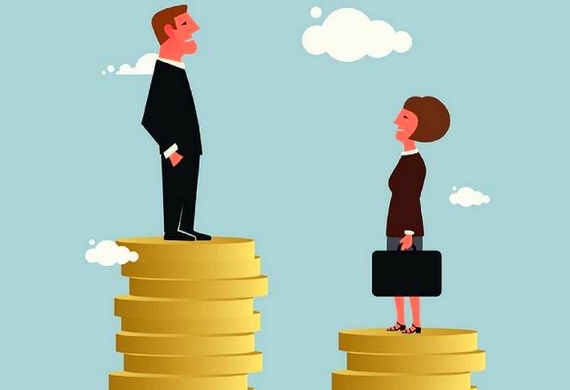
26 Percent Women Cite Gender Pay Gap in New International Survey
By: WE STAFF | Tuesday, 2 February 2021
Gender equality and disparity are still a huge issue in India. In a recent international survey on gender equality opinions and experiences during the COVID-19 pandemic, most of the female respondents (87 percent) from India have stated that they feel the risk, or know someone in the circle who feels the same feeling of assault or harassment in some place or another. In the same survey, about 26 percent women stated that they are not paid as much as their male counterparts.
According to India-based findings of the report by Women Deliver and Focus 2030, women in India cited public places to be the most common place where they felt at-risk. 55 percent of female respondents feel at-risk, or know someone who feels at-risk, ‘online’, and 40 percent do ‘in the place where (they) work or study’. “26 percent of female respondents in India feel at-risk, or know someone who feels at-risk, of assault or harassment in their home,” said the report. Of the 1,003 respondents surveyed, 48 percent of female respondents in India state that they have had their “freedom of movement restricted against their will by family members or (their) partner”.
As per the report, 60 percent women find it acceptable for women to refuse sexual intercourse with their partner; and 56 percent find it unacceptable to whistle at a woman in the street, or touch her without her consent. 35 percent think it acceptable to share a sexist joke about a woman with friends or on social media, while 51 percent find this unacceptable.
Sexual and reproductive health and rights - When it comes to bodily autonomy and sexual and reproductive health and rights, 1 in 10 want provision of access to contraception and family planning, good maternal health, and sex education in schools. Female respondents who migrated for a job or better economic opportunities are particularly keen on an increase in access to sexual health services compared to other females. 26 percent of female respondents in India stated that they have had difficulty accessing their chosen method of contraception and 20 percent have had difficulty accessing abortion and post-abortion care, said the report.
Economic justice and rights - 17 percent of respondents rank ‘implement access to well paid jobs, equal pay, financial independence, and property rights’ as their number one priority. In order to improve women’s economic opportunities and decision-making powers, respondents cite measures like preventing violence and sexual harassment in the workplace, guaranteeing social protection and decent working conditions for women in low paying jobs and achieving equal access to education and professional training for women and men.
Notably, according to the report, 26 percent of female respondents in India said that they are not paid as much as male counterparts where (they) work. This figure rises to 32 percent among female respondents aged 45 to 59. Furthermore, 28 percent females feel that they have not had the same access to promotion opportunities as (their) male peers. 26 percent of female respondents have not or will not receive the same inheritance as male relatives, and 30 percent have had difficulty accessing education and professional training compared to (their) male peers or relatives. 40 percent of male respondents and 44 percent of female respondents deem it acceptable to let women do the majority of housework, childcare, and elderly care.
Impact of COVID-19 - Females in India seem to have been adversely affected by the COVID-19 pandemic on a greater scale than their male counterparts. Forty-five percent expect inequality between women and men will rise as a consequence of COVID-19. A strong majority (89 percent) think that women should be involved in all aspects of the global health response and recovery efforts to COVID-19. During the COVID-19 pandemic, 67 percent females in India said that their time doing household work has increased. Ten percent have lost their job and 29 percent could not do as many hours of paid work as they usually would.
“We’ve made a lot of progress on gender equality over the last 25 years, but there’s so much work left to do. Now, with COVID-19, just as women are assuming an outsized role in responding to the pandemic in their communities and at home, they are also experiencing enormous added burden, and we could see the consequences of that strain playing out for years to come,” said Divya Mathew, Senior Manager, Policy and Advocacy at Women Deliver. She also added “This survey shows us where the world has fallen short, but it also delivers the encouraging news that the vast majority of women and men around the world expect their leaders to take action to advance gender equality”.
Most Viewed
- 1 Women's Health Startup HerMD Closing Doors Amid Industry Challenges
- 2 5 Famous Women in Indian Armed Forces
- 3 Saudi Women No longer Require Male Permission for Clothing Choices, says Prince MbS
- 4 Kolkata Medtech Startup Innovodigm Raises Rs 5.5 Crore Seed Funding Led by IAN Group
- 5 Yamunanagar's Kashish Kalra Honoured after Securing 111th Rank in UPSC Civil Services Exam
- 6 Madurai Appoints Its First Woman Corporation Head
- 7 IAS Vijayalakshmi Bidari Appointed as the new Nagpur Divisional Commissioner
- 8 American Entrepreneur Lucy Guo Overtakes T Swift to become Youngest Female Billionaire
- 9 ICC Women's World Cup 2025 Trophy Showcased at Indore's Holkar Stadium
- 10 Aparna Saxena's Beauty Venture AntiNorm Launches in India
- 11 Vidya Nataraj Co-Founded BlueStone Jewellery & Lifestyle files IPO
- 12 5 Women Freedom Fighters of India
- 13 Dr. G Krishnapriya appointed as CEO for Trichy
- 14 M3M & Sirona Partner to Introduce Menstrual Hygiene Vending Machines in 15 Locations
- 15 Punjab Govt launches SHE Cohort 3.0 Supporting Tech-led Women Startups
- 16 Indian origin Lawyer, Sweena Pannu appointed as the US New Superior Court Judge
- 17 The Aurora Tech Award recognizes 4 Indian Women-led Startups
- 18 Kerala's Republic Day parade featured an all-female tableau
- 19 Manisha Kabbur Becomes Karnataka's First Woman International Karate Coach
- 20 Director K. S. Ravikumar's Daughter Maalica Ravikumar Launches Life Coaching Company 'Evergrowth Academy' for Women
- 21 Leezu's Raises Pre-Seed Funding to Accelerate Growth in Sexual Wellness Industry
- 22 Sattu: Super-easy summer drink for PCOS gut healing
- 23 Swathi Nelabhatla creates Sitha App, India's First Women-Exclusive Gig Platform
- 24 7 Timeless Female Kathak Dancers & their Iconic Legacies
- 25 Meet 7 Iconic Women Architects of Modern India & their Most Impactful Work
- 26 This Woman-led Insuretech Startup is Helping Bridge the Education Financing Gap in India
- 27 Women Leaders Share Lessons Learnt from India Women's WC Win
- 28 5 Enterprising Women Founders Powering Singapore's Tech & Innovation Landscape
- 29 4 Women. 4 Stories. One Vision for Smarter, Stronger Healthcare
- 30 Global Gender Gap Narrows to 68.8%, But Full Equality 123 Years Away: WEF Report 2025
- 31 Changemakers: 7 Women Entrepreneurs Taking the Make in India Movement Forward
- 32 Meet Lucy Guo, The Youngest Self-Made Female Billionaire Disrupting Tech
- 33 How Women are Driving India's Festive Online Shopping Surge






